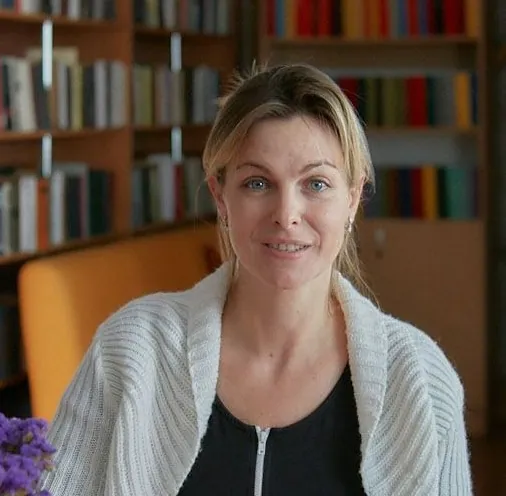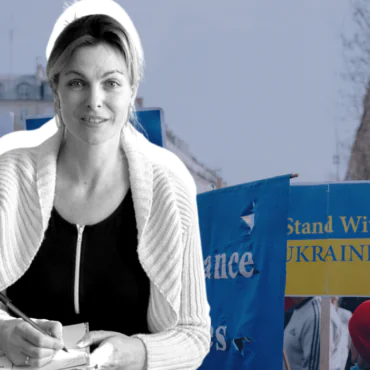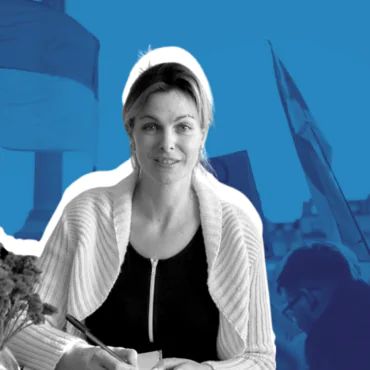One, two, three. , fourth. , fifth parts.
I’ve learned to cry here on a strict schedule and I go to an ancient cemetery to do it. It’s beautiful, it’s quiet, no one alive can see you, and the dead might even get a thrill out of listening to some news. I reread news from the front lines and reports from my hometown, shelled daily, weep to the point of devastation, come to my senses, rush on… Exclusively on Mondays and Thursdays, between work in the library and the extravaganza of the cafe employee.
But it’s different now. A letter from a potential publisher has turned the armor of my discipline into a brittle pulp, torn it into shards, jammed them into my heart and twists them there with manic persistence, neither wanting to be forgotten nor to stop hurting. The schedule of crying, accordingly, rolled away, and I, hiding my eyes from the concerned passers-by, spitting on all business, uneven nervous gait rushed to the saving grave solitude.
The place is absolutely magical, by the way. The slanted tombstones with almost erased lines of coats of arms alternate with perfectly preserved slabs painted with small beads of quite readable letters. There are graves from the middle of XIX century, the newest – from the beginning of XX century. And there’s no fresh ones at all. With all the paths cleaned, the wickets oiled, the fence painted and even the caretaker’s house standing at the wrought iron gate.
I saw her once and, to justify my intrusion, entered the conversation:
– It’s wonderful,” I began, “that you have a cemetery in the middle of town. You can come in at any time, relax in the shade…..
– It’s fine,” the caretaker agreed or vice versa, smiling wickedly, “that we have a town around a cemetery. And the stores are close by, and it’s not too far for the kids to go to school.
About the children, by the way, she exaggerated significantly – not “not far”, but right very close. Literally – an alley with graves without any fences smoothly passes into the park zone of Igor’s primary school.
It used to surprise me. In a good way. I even shared with Igor’s friend’s mom when we both happened to arrive early and waited for the kids to be taken out.
– I admire,” she said, “the way the dead are treated here. No fear (and in some places they like to hide cemeteries away as if they don’t exist), no cult (and there are those who like to put a grave in a prominent place and worship it with the whole country). You’re doing well with it: death is the natural end of life, the departed are a natural part of it. That said, it’s an important and respected part that isn’t hidden from children, but it’s also not considered something off-limits, obliging them to switch to whispering. I like it very much… Although, I admit, the fact that our school is located right next to the cemetery, I was at first quite impressed. Then I thought about it: what a beautiful philosophy.
– No philosophy, it just happens,” they smiled back at me. – Where there’s a church, there’s a school. But where there’s a church, there’s a cemetery. So it’s all right there. No surprise there. And our treatment of the dead, believe me, is the most common…..
We sat on a bench with engraved dates of birth and death (no, not the bench, but the deceased, in whose honor – and for the benefit of the citizens – this bench was built). So about the “usual attitude” you could argue. But I didn’t for some reason. I think it was just about time to pick Igor up from school.
Oh yes, about the time. This is where I need to explain why I suddenly decided to train a delayed start mode for crying and any other moral breakdowns in the first place.
The first time I had an outright tantrum was back in Belgium, where the kids and I were waiting for English visas. I learned about the death of a close friend (he was delivering food and medicine in Kharkov, died as a hero, I wrote about it here before) and roared like a beluga.
– Mommy! – whispered my five-year-old Igor at the time. – Don’t cry, please. You, when you wheeze like that, you’re scarier than war.
It became clear that I will no longer weep in front of my youngest (it’s stupid to take him away from the war and make it worse for him). Oh, and the older man’s nerves should probably be spared. That’s how tears became taboo at home.
The second time I sobbed in public at work in my cafe. Under completely innocent, by the way, circumstances: a bunch of triathletes stopped by after training (now I know they are regular Saturday visitors and they are very cool). We discussed running, bikes, and who is planning on starting what marathon this year. And then it hit me. In the same way, not so long ago, my favorite running club teammates and I were sitting in Kharkov in Gorky Park after Saturday’s long run and were also planning something, making fun of each other from head to toe, cheering each other on…. Now part of the team is on the front line, part is volunteering in the rear without sleep and rest, the park is badly damaged by bombing, all the plans are ruined, all the “ridicule” is over…. And here people have a normal life. It goes on as if nothing had happened, as if enemy missiles were not flying into peaceful Ukrainian homes right now. And it’s nice to have a peaceful-normal here, but why can’t we have that anymore?
In short, I had to quickly run to the back room, pour tons of ice water on my sobbing face, search the bottom of my bag for a new smile and other cosmetics.
After that, I decided to turn on my emotions on a strictly scheduled basis. I live, I work (almost like a “crocodile in a zoo”), I do everything I have to do, and then in a specially designated place and time I give myself over to all my misfortunes. Well, I mean, I wish I could…. But sometimes – like now, after the above-mentioned letter from the publisher – I still fail.
You’re probably scolding me by now. You’ve noticed that I write about anything to delay the moment of telling you about the message that upset me and the plans. So far, I’m having trouble not only writing about it, but even mentally putting it all together into coherent non-branch words. So here, here’s a quote:
“Ira, hello. You were recommended to us as an author who can write good children’s texts. In cooperation with rehabilitation doctors and on their recommendations, we decided to publish books for children who have lost limbs. Something to help further adaptation. There are English-language analogs, but without taking into account our mentality. There was never anything like this in Ukraine before, nothing similar was published, so now there is a great shortage of such literature…”.
Think about it! The 21st century, Europe, the number of limb-deprived children is already such that a series of adaptation books is needed….
I don’t know how to make sense of it all yet. What about you? Do you understand what to do?
